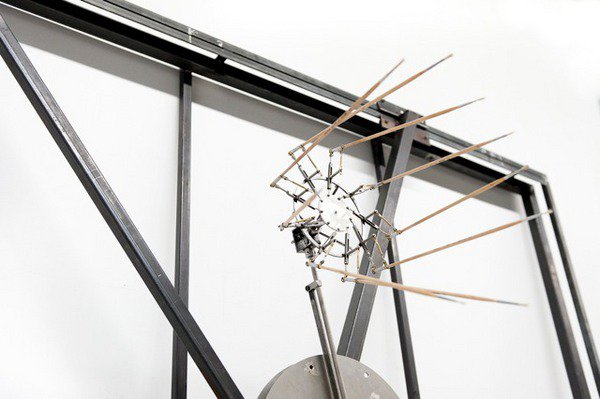Rueyshiann Shyu
dal 3/11/2011 al 28/11/2011
Segnalato da
3/11/2011
Rueyshiann Shyu
Tenri Cultural Institute, New York
Journey. This series is about the journey of life. All living beings cycle from point zero, expand into infinity and retrace to the origin. Any point can be the beginning or the end. Journey documents objects through time and space, it explores the nature of life and death.

This series is about the journey of life. All living beings cycle from point zero, expand into infinity and retrace
to the origin. Any point can be the beginning or the end. Journey documents objects through time and
space; it explores the nature of life and death.
In this exhibition each story is constructed using hundreds or even thousands of mechanical components.
Their basic movement is circular, like the journey of life. Through the change of structural links, it creates
the interplay between the motion and object, lays down an abstract landscape of memory and breathes life
into each story.
Artists have struggled since the 19th century to overcome the static nature of sculpture and painting.
As seen in Degas’s dancers and horses, he signaled movement by using pentimenti in parallel strokes by
their legs. This element was also evident in Matisse’s dancers. Boccioni and the futurists attempted to produce
dynamism in their works by using repetitive line but it wasn’t until actual moving sculpture was invented that
artists were successful in reaching their goal.
The history of kinetic art reaches back to Duchamp and his
readymade Bicycle Wheel, 1913 whose single wheel was secured atop a kitchen stool. Duchamp was interested
in the accidental effects of movement as opposed to Shyu’s painstakingly created pieces whose very motion is
studied. The Constructivists Naum Gabo, Antoine Pevsner, as well as the Bauhaus artist Laszlo Moholy-Nagy
and the American Alexander Calder created kinetic sculpture as early as the 1920s. Today kinetic art has
incorporated sophisticated digital technologies, as well as light and new mechanical methodologies that drive
sculptures via wind power, the principle of equilibrium of weights, etc.
Shyu has been working with kinetic sculpture and mechanic installation since 1997. The artist explores the nature
of dynamic movement through the use of precision and complexity to create works that challenge the viewer but
that also touch the human heart with narratives from his own Taiwanese cultural background. His materials and
working methods combine to result in artistic creations that explore the very nature of life.
Shyu has exhibited extensively at prestigious venues around the world, and his works appear in numerous public
collections worldwide, including: The National Taiwan Museum of Fine Arts, Taichung; Chelsea Art Museum,
New York; Taipei Gallery, New York; Location One, New York; Stone Villa, Sydney; Kaohsiung Fine Arts
Museum; Museum of Contemporary Art, Taipei; Hong Kong Arts Center; Perth Institute of Contemporary Arts,
Australia; Eslite Art Gallery, Taipei; Taipei Fine Arts Museum; Montbeliard, France.
Opening: Friday November 4th, from 6-8pm
Tenri Cultural Institute
43A West 13th Street New York
Hours: Monday ~ Thursday: 12 pm ~ 6 pm. Saturday: 10 am ~ 3 pm
Admission free



